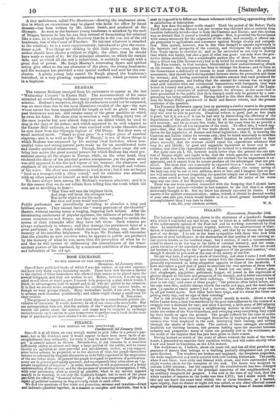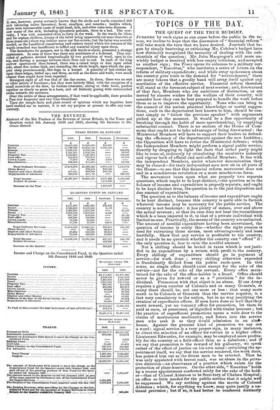IRELAND. Roscommon, December 301k.
The balance against industry, shown in the statement of a landlord's finanoes with which I concluded my last letter, may be taken as a sufficient explanation of the unfavourable opinion of the Poor-law and its working entertained by that class. In undertaking my present inquiry, however, the ascertainment or eluci- dation of landlord-opinions termed but a part, and that by no means the largest part of my design. I do not in the least sympathize with those who look with pleasure or even indifference to the destruction of that portion of our existing so- cial system known as the landlord class; but I confess, if such a consummation could be shown to be the way to the birth of national industry, and the conse- quent elevation of the standard of civilization among the masses, 1 for one would not hesitate in deciding for the "greatest happiness of the greatest number," even though it should be procured at the cost of the misery of the few. On my way here, I adopted a mode of travelling, and since I came I took other precautions, which brought me into contact with the classes whose interests are generally represented as being altogether opposite to those of the landlords. I have also taken a good deal of pains to ascertain the real opinions of those whom I met; and from all, I can saftly say, I heard but one story. Farmer, gra- zier, shopkeeper, pig-jobber, policeman, beggar, all joined in the expression of gloomy despair at the state and prospects of the country, and in bitter execration of the Poor-law as the cause of all their sufferings. "We have known many a hard year in our day," said some of these people; "the potatoes often failed before, and the oats were thin, and the disease struck the cattle and pigs, and the meal-man- gers [a species of rustic usurer] had a harvest; but when the new crops came in, all got round again. Now there have been crops, and it's worse the times are getting every day, and no sign of their mending." Nor is the strength of these feelings shown merely in words. About a week before I came here, a man was murdered by the poor-rate collectors in the course of a struggle over a distraint for rate; and since 1 arrived, a little army of 300 infantry and 25 horse has been scouring a neighbouring district in the county of Mayo under the orders of the Vice-Guardians, and sweeping away everything they could lay their bands on upon the ground. The people suffered for the time in sullen silence; but they have since revenged themselves by waylaying and beating the carmen who were employed in the raid, destroying their loading, and sawing through the shafts of their carts. The authors of these outrages are neither landlords nor thriving farmers, but persons halting upon the marches between industry and pauperism: many of them are probably now in the workhouse, as the result of the impulse that has just been given to their course.
Having learned BO much of the state of affairs without the walls of the work- house, 1 proceeded to examine their condition within, and will relate shortly what I saw and heard in Castlerea, on the 17th instant.
The workhouse is, I believe, about six years old, and has all that peculiar ap- pearance of misery that belongs to a building partially dilapidated and yet not quite finished. The windows are broken and unglazed, the fireplaces imperfect, the walls unplastered and newly covered with cold-looking whitewash. The yards, when I saw them, were dirty and littered with straw, and were surrounded with slight wooden sheds for the reception of the sick. The house was designed to contain 1,000 inmates ; but the capacity of the establishment has bees enlarged by renting Wills Grove, one of the principal mansions of the neighbourhood, as an auxiliary receptacle for paupers. I was told at the time of my visit, that the whole number of inmates on the books was then 3,272; but I doubt much whe- ther any one knew the exact total within two or three hundred ; as I learned, upon inquiry, that no dinner or night roll was called, or any other effectual means adopted for _obtaining an exact account of the fluctuating mum of human .misery. It was however, pretty certainly known that the sheds and wards obtained 500 siat labouring under dysentery, fever, smallpox, and measles ; besides which, there were innumerable cases of scald-head, itch, and other cutaneous diseases. I saw many of the sick, 'including dysenteric patients, three in a bed. The mor- tality, I was told, amounted often to forty in the week. In the wards for idiots and for orphan children, (many of the latter being apparently mit more than two or three years old,) there was neither nurse nor fire-screen; but the latter was scarcely needed, as the handful of smouldering turf-embers round which the inmates of the wards crouched was insufficient inflict any. material injury upon them.
The dormitories for paupers, not in the sick wards or-sheds, presented a strange appearance. In none of them was there any semblance of a bedstead. They con- sisted of galleries divided longitudinally by two partitions of wood, open at the top, and leaving a passage between them from end to end. In each of the long narrow apartments thus formed, there was a raised ledge or dais upon either side, abontive inches high, and extending the whole length, upon which the pau- pers sleep promiscuously, like dogs in a kennel. A quantity of bed-clothes lay upon these ledges, folded up ; and these, as well as the floors and walls, were much cleaner than might have been expected. Strangest sight of all was that of the day-rooms. In these, there was no seat or other article of furniture ; but they were entirely filled, with the exception of a siball semicircle at the door, by human creatures, sitting on their heels, packed together as closely as geese ma barn, and all listlessly gazing with outstretched necks towards the entrance.
-Over the-entire of these arrangements, if that word be applicable, there presides a Poor-law Inspector and two Vice-Guardians. Upon the simple facts and plain record of opinions which my inquiries here have enabled toe to narrate, it is not my purpose at present to offer any com- mentary.































 Previous page
Previous page